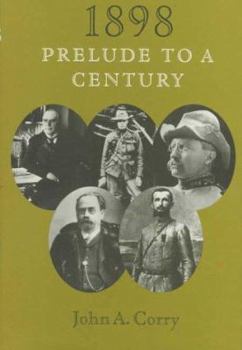1898: Prelude to a Century
1898 was the year in which the United States first became a world power. In a decisive victory in a war with Spain lasting less than four months, it acquired territories in the Caribbean and Pacific, and positioned itself so that the Twentieth Century became to many "The American Century." This was not the only way that 1898 set the course for the next hundred years. The year also saw the first flowering of the "special relationship" between the United States and Great Britain that so significantly influenced the next century. By contrast, the mecurial Kaiser William II's decision to expand the German navy together with Germany's rejection of an English effort to foster better relations set the two countries on a collision course that eventually led to war. Meanwhile the resolution of a dramatic confrontation between England and France in the southern Sudan led the two countries to end their long-standing colonial rivalry and later join as allies in two World Wars. Finally, the turmoil created by France's Dreyfus Affair evidenced the strong anti-Semitism in supposedly enlightened Western Europe that foreshadowed the Holocaust. It tells the story of the larger-than-life Theodore Roosevelt as he put the American navy on a war footing, led his Rough Riders up San Juan Hill, and waged a tumultuous "whistle stop" campaign to win election as New York's Governor. Other memorable characters include the cautious President William McKinley, whom events transformed into a committed imperialist, the ambitious twenty-three-year-old Winston Churchill, who emerged for the first time as a public figure, novelist Emile Zola, who exiled himself from France to escape imprisonment for his accusations inthe Dreyfus case, and the intrepid Captain Jean-Baptiste Marchand, who led a small French contingent through more than three thousand miles of African wilderness only to be ordered home from his post on the Upper Nile.
Format:Hardcover
Language:English
ISBN:0966157001
ISBN13:9780966157000
Release Date:February 1998
Publisher:Fordham University Press
Length:374 Pages
Weight:1.80 lbs.
Dimensions:1.2" x 6.3" x 9.3"
Customer Reviews
2 ratings
A very well thought out and researched work.
Published by Thriftbooks.com User , 26 years ago
Mr. Corry has written a fine piece of research on a very important topic. His working premise, namely that the stage for the 20th century was largely set in 1898, is very well supported and documented in this piece. I found it to be a very enjoyable and educational read on a period of time too often ignored in a standard American history course. Kudos on his first book.
A good introduction to the late 19th century
Published by Thriftbooks.com User , 27 years ago
I was a bit disappointed in the book.There is little information about the sweeping technological changes in the late 19th century. I wish there was a chapter on airplanes, automobiles, telephones,and the wireless. These developments were in the seminal stages in 1898,and would have enormous ramifications for the 20th century. Yet the book has much to offer. The Spanish-American War is covered well. Corry offers us a tantalizing glimpse of the American ground war against the Filipine insurgents. I liked the anecdotes, for example Lieutenant John Pershing leading a black regiment in Cuba, thus earning the nickname Black Jack.The Battle of San Juan Hill was described well enough for the uninitiated, but I preferred that the horrors of war were better elucidated. That doesnt mean that Corry was glamorizing war; he points out the high American casualties due to battle and disease. Corry gives us a panaramic view of international relations in the late 19th century.I am impressed with his grasp of geopolitics.There are pages devoted to the Dreyfus affair, colonial prerogatives in Africa, growing British accommodation with the U.S. and France. Read how France and England almost come to blows over Fashoda, a fort in Africa that was occupied by Marchland. It was to Britains credit that they behaved with some restraint. However , Corry does an inspiring job when he describes how the British fleet bottled up the French fleet at Brest and in the Mediterrean. This action gave the British a free hand over the French West Indies. The French had no choice but to capitulate in the end, and abandan Fashoda. William McKinley and Theodore Roosevelt are contrasted well. One is cautious while the other is headstrong. At one point Roosevelt seizes the initiative and puts the American Navy on a war footing. Roosevelt ,at times comes across as a loose cannon, but Corry points out that Roosevelt does serve with distinction. Nonetheless, Corry does make one vital point, and any reader of this book should take note. McKinley was far more in tune with the brutal realities of war than Roosevelt. McKinley served in the Civil War when he witnesses the carnage at Antietam. It's little reason why, at least initially, he wanted to avoid a confrontation with Spain. After reading this book I wondered if McKinley has been somewhat underrated as president. I'll put this very succinctly, if you want to read a good "into the water" about the world in 1898, then I recommend this book.The only problem is it's got two gaping holes. It doesnt go into the surging technological developments, nor do you get a feel of how the average citizen lived in 1898. The book was good overall, thus I'm confident Corry would have presented this information in an entertaining fashion.






